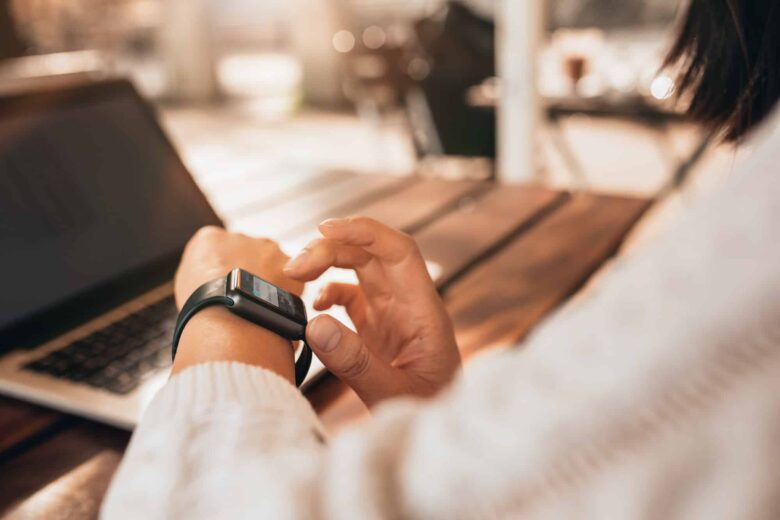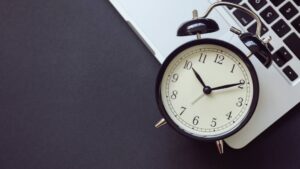In today’s fast-paced digital world, technology is both a blessing and a challenge. It offers us unprecedented information, connectivity, and convenience, but it can also take a toll on our physical and mental health. For digital nomads and remote workers who rely on technology for their income, maintaining a work-life balance is important. Technology can help us focus, monitor, and improve our digital health, and that’s good news. This article discusses the best tech tools and tips to stay healthy in a world where everyone is connected.
1. Wearable Tech Products
Wearable technology like fitness trackers and smartwatches have changed the way we care about our health. Smartwatches like the Apple Watch, Fitbit, and Garmin can track your steps, heart rate, sleep quality, and even your stress levels. These ideas can help you move more during the day, sleep better, and be healthier overall.
Wearable technology can remind digital nomads who spend long hours in front of screens to get up, stretch, and take a break. Many devices also offer guided breathing exercises and mindfulness reminders that can help you manage stress and keep your mind clear. Using a wearable device every day can help you monitor your health data and make changes as needed to improve your overall health.
2. Meditation and Mindfulness Apps
Anxiety and stress are common problems in a tech-enabled life. Mindfulness and meditation apps like Headspace, Calm, and Insight Timer make it easy to incorporate mental relaxation into your daily life. These apps offer guided meditations, breathing exercises, and sleep stories that can help you relax, focus, and sleep better.
These apps can transform the lives of digital nomads who are constantly dealing with changing time zones and busy schedules. Having a personal meditation guide at your fingertips can help you enjoy a moment of self-relaxation anytime, anywhere. Using these apps regularly can strengthen your mind, help you better manage your emotions, and help you cope more evenly with the demands of digital work.
3. Computer Detox Tool
Too many alerts, emails, and social media posts at once can easily lead to digital overload. Digital detox tools like Freedom, AppBlock, and StayFocusd can help you limit the number of apps you use, block distracting websites, and schedule screen-free time. These tools are especially useful for maintaining focus on work and limiting how much digital you use.
Digital nomads need to track their screen time to avoid burnout. Using a digital detox tool can help you develop a healthier relationship with technology and stay productive without feeling overwhelmed. Taking regular breaks from technology, like taking a walk or doing some hobbies, can help you clear your head and absorb the negative effects of too much screen time.
4. Comfort Enhancements
When people work on the go, they often have to use temporary workspaces. This can lead to poor posture and physical strain. Getting ergonomic accessories like portable laptop stands, external keyboards, and comfortable mice can make a big difference in the way your body functions. These tools help you work more naturally, reducing your risk of neck pain, back pain, and strain injuries.
If you work in multiple locations, you may also want to consider a foldable standing desk or portable chair stand. These items are small and lightweight, making them easy to carry. They can also make you more comfortable during long work sessions. Making ergonomic health a priority can help you stay productive and prevent long-term health problems caused by poor posture.
5. Sleep Technology
While getting enough sleep is important for your health, it can be difficult to do, especially when you’re traveling or working unpredictable hours. Some sleep technology, like white noise machines, smart sleep masks, and apps like Sleep Cycle, can help you track and improve your sleep patterns. These tools can give you information about the quality of your sleep and give you tips on how to get better rest.
If you have trouble falling asleep because of screens, wearing blue light-blocking glasses at night can also help your body prepare for a good night’s sleep. Using sleep technology can help you stick to a regular sleep schedule, which is important for staying healthy, focused, and energized.
6. Nutrition Apps
It’s hard to maintain a balanced diet when you’re always on the go. But nutrition apps like MyFitnessPal, Yazio, and WaterMinder make it easier to track what you’re eating. You can use these apps to track your macronutrient intake, log your meals, and set reminders to drink water. This way, you can make sure you stay nourished and hydrated throughout the day.
For digital nomads, eating healthy is an important part of staying healthy while traveling. You can use these apps to find healthy food options in new places, plan meals, and stop eating bad foods. Understanding what you eat can help you maintain a steady energy level and benefit your overall physical and mental health.
Conclusion
Technology is an important part of modern life, especially for digital nomads who use technology to work, communicate, and have fun. But it’s important to be careful when using technology to avoid deteriorating your physical and mental health. By using blue light filters, wearable technology, mindfulness apps, digital detox tools, ergonomic accessories, and other technology solutions, you can make your digital life healthier and more balanced.
Being proactive about your digital health ensures that technology works for you, not against you. Embrace technology tools that are good for your health, set boundaries when necessary, and prioritize habits that will help you live a healthy, long-term digital nomad life.
FAQs
1. What does ‘digital health’ mean?
Digital wellness means maintaining a healthy balance between using technology and taking care of your health. It means using technology in smart ways to improve your physical, mental, and emotional health without letting your devices and digital habits ruin your life.
2. How can the technology I wear as a digital nomad help my health?
Wearable technology, like fitness trackers and smartwatches, tracks your heart rate, sleep patterns, and other information. Even when you’re on the go, these tips can help you stay active, sleep better, manage stress, and maintain overall health.
3. Which apps help you best manage stress and anxiety?
Guided meditations, breathing exercises, and relaxation techniques in apps like Headspace, Calm, and Insight Timer can help you reduce stress and anxiety. These apps are great for digital nomads who need to clear their heads at all times.
4. How do you keep tired eyes from staring at the screen?
Blue light filtering apps like f.lux, Night Shift, and Twilight can reduce the amount of blue light emitted from your screen, which can help relieve eye strain. Using the 20-20-20 rule and taking regular breaks can also help protect your eyes from digital fatigue.
5. What are digital detox tools? How do they work?
Digital detox tools like Freedom, AppBlock, and StayFocusd can help you free up time from technology, limit your screen time, and block distracting apps. They can help you stay on task, reduce digital clutter, and develop a healthier relationship with technology.




